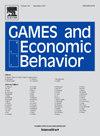Costly waiting in dynamic contests: Theory and experiment
IF 1
3区 经济学
Q3 ECONOMICS
引用次数: 0
Abstract
We extend the war of attrition by studying three-period dynamic contest games. In our game, players can either fight against their opponents at the last period or can fight at any period. Waiting is costly. We focus on the role of waiting costs and show that the value of waiting costs is a key factor in determining the type of equilibrium in such dynamic contests. Specifically, when players are allowed to fight only at the last period, as waiting costs increase, contests end earlier, battles are less likely to occur, and the weaker player in a pair is more likely to flee. When allowing players to fight at any time, the pure-strategy Bayesian equilibrium does not exist under sufficiently high waiting costs. A lab experiment verifies most key features of our model in scenarios where players are allowed to fight only at the last period. However, unlike theoretical predictions, we find that as waiting costs increase, the duration of contests and the frequency of battles fail to drop as significantly as theory predicted. In the case where players are allowed to fight at any period, we observe a substantial increase in the frequency of battles, accompanied by a dramatic reduction in the duration of contests compared to the format where players are limited to fighting during the last period. We find evidence of suboptimal behavior among players in both contest formats.
动态竞争中的等待成本:理论与实验
通过对三期动态博弈的研究,对消耗战进行了拓展。在我们的游戏中,玩家可以在最后阶段与对手进行战斗,也可以在任何阶段进行战斗。等待是代价高昂的。本文重点研究了等待成本的作用,并指出等待成本的价值是决定动态竞争中均衡类型的关键因素。具体来说,当玩家只被允许在最后阶段战斗时,等待成本会增加,比赛会提前结束,战斗发生的可能性更小,一对中的较弱玩家更有可能逃跑。当允许玩家随时战斗时,在等待成本足够高的情况下,纯策略贝叶斯均衡就不存在了。在玩家只允许在最后阶段战斗的场景中,实验室实验验证了我们模型的大多数关键特征。然而,与理论预测不同的是,我们发现随着等待成本的增加,竞争的持续时间和战斗的频率并没有像理论预测的那样显著下降。在允许玩家在任何阶段战斗的情况下,我们观察到战斗频率的大幅增加,与玩家在最后阶段被限制战斗的形式相比,伴随着比赛持续时间的大幅减少。我们发现,在两种比赛形式中,玩家都存在次优行为。
本文章由计算机程序翻译,如有差异,请以英文原文为准。
求助全文
约1分钟内获得全文
求助全文
来源期刊

Games and Economic Behavior
ECONOMICS-
CiteScore
1.90
自引率
9.10%
发文量
148
期刊介绍:
Games and Economic Behavior facilitates cross-fertilization between theories and applications of game theoretic reasoning. It consistently attracts the best quality and most creative papers in interdisciplinary studies within the social, biological, and mathematical sciences. Most readers recognize it as the leading journal in game theory. Research Areas Include: • Game theory • Economics • Political science • Biology • Computer science • Mathematics • Psychology
 求助内容:
求助内容: 应助结果提醒方式:
应助结果提醒方式:


